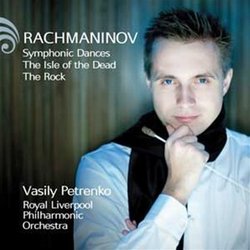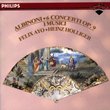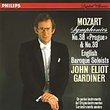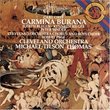| All Artists: Royal Liverpool Philharmonic Orchestra, Vasily Petrenko:conductor, Sergei Rachmaninov Title: Symphonic Dances Members Wishing: 2 Total Copies: 0 Label: Avie Release Date: 2/9/2010 Album Type: Single Genre: Classical Style: Symphonies Number of Discs: 1 SwapaCD Credits: 1 UPC: 822252218824 |
Search - Royal Liverpool Philharmonic Orchestra, Vasily Petrenko:conductor, Sergei Rachmaninov :: Symphonic Dances
 | Royal Liverpool Philharmonic Orchestra, Vasily Petrenko:conductor, Sergei Rachmaninov Symphonic Dances Genre: Classical Avie's fruitful association with the Royal Liverpool Philharmonic Orchestra yields its tenth release, and the third with Vasily Petrenko, the youngest Music Director in the RLPO's illustrious history. A native of St. Peter... more » |
Larger Image |
CD DetailsSynopsis
Album Description Avie's fruitful association with the Royal Liverpool Philharmonic Orchestra yields its tenth release, and the third with Vasily Petrenko, the youngest Music Director in the RLPO's illustrious history. A native of St. Petersburg, Petrenko appropriately continues his exploration of Russian repertoire with the first in a series of orchestral works and concerti by Rachmaninov. Petrenko won the Classic FM/Gramophone Young Artist of the Year award in 2007, and in 2009 he and the RLPO garnered the Gramophone Award for Best Orchestral Recording. Since arriving in Liverpool in 2006, Petrenko has had a galvanizing effect on the RLPO, attracting unanimous critical acclaim. Having recently renewed his contract through 2015, Petrenko and the RLPO are poised to further spread their success story through these recordings for Avie. Similarly Requested CDs
|
CD ReviewsA stupendous disc Ralph Moore | Bishop's Stortford, UK | 03/06/2010 (5 out of 5 stars) "As the Santa Fe listener kindly acknowledges in his review, I recently blind-tested ten versions of the "Isle of the Dead" for another classical review website. I was initially daunted by the task, but in the event I have to say that I found it both remarkably enjoyable and remarkably reassuring how easily I was able to decide upon a hierarchy of quality - and this one easily came out on top. I was delighted when my suspicions were confirmed that my favourite was indeed this recording by Petrenko; it is extraordinary how good the Royal Liverpool Philharmonic now sounds under their trio of distinguished conductors (Pesek, Mackerras and Petrenko himself) and for me this disc becomes one of the finest on my shelves. The opening of the "Isle of the Dead" is crucial: a mood of grim inevitability must grip the listener, who should see and hear Charon's oars dip steadily, in relentless 5/8 time, into the black waters of the Styx, as per the mysterious painting by Arnold Böcklin. Rachmaninov saw it in 1907 and it inspired him to compose his musical evocation the following year. If the rhythm is too fleet and the craft drifts unsteadily, the requisite mood is lost. While this piece is episodic, with identifiable interludes as the soul reminisces and struggles to make sense of its fate, there must be an over-arching sense of shape to unify the experience; some of the performances in the ten I listened to fall into the trap of stressing transient drama at the expense of musical unity, while others simply fail rise above a timid fidelity to the score and deliver no punch at crucial points. Of the four I really liked, only one was compromised by the sound: Ansermet and l'Orchestre de la Suisse Romande are recorded in hissy, strident mono but theirs is a reading of such integrity and musicality that it transcends those limitations. However, if you want the finest modern sound, three are in a class apart, by virtue of their combination of sound quality and artistic achievement: Batiz on Naxos (see my review), the celebrated Ashkenazy version on Decca, and the one currently under review. They are clearly self-recommending and individual taste must be the arbiter of choice, although I have a clear personal favourite, and it is this Petrenko recording. (Some favour the famous Reiner/Chicago recording; it does not do it for me; my blind-listening notes read: "rushed, yet nerveless, like a hyperactive patient with a failing pulse. We scud sporadically over shallow waters. The orchestra suffers from poor intonation, especially in the woodwinds." Nor do I think he really delivers at climactic points.) Petrenko achieves a miracle of interpretation and the disc is sonically superlative. Its timing (20:55), phrasing, control and understanding of the dynamic relationship between the disparate sections are all ideal. As much as I enjoyed the other three discs in my top category, this was the only one to give me genuine goose bumps as I listened. This is passionate, thrilling orchestral direction and playing, from the overwhelming tragedy of the soul's agony to the searing poignancy of the central section, full of yearning nostalgia for times past. Every mood is embraced from febrile panic to desperate regret; no other version manages this kind of range. When, in the music's closing stages, the hammer blows which seal the soul's fate yield to pitiless ticking of a universal clock, the effect is intensely dramatic and the listener is made to appreciate anew the wonder of this extraordinary composition. The "Symphonic Dances" are equally thrilling: taut, intense and nervy, then suddenly lyrical and voluptuous; the sensibility of Rachmaninov the hyper-sensitive Russian Romantic is perfectly captured. "The Rock" might be a relatively immature work and was poorly received by the sniffy, parochial British critics when it was performed in London, but it remained a favourite of the composer all his life and instantly reveals his gift of manipulating swirling, Impressionistic colours even if there is an element of repetitiveness and some lack of invention in the variations. My only previous acquaintance with this work was the excellent Decca Eloquence disc of this and the ill-fated First Symphony with, once more, l'Orchestre de la Suisse Romande conducted by Walter Weller; this version here is obviously in superior sound and takes a sharper, snappier approach which perhaps papers over any longueurs without sacrificing its yearning quality. If the stature of this recording is indicative of things to come, I am really looking forward to future issues by the same team - such as the new Rachmaninov Piano Concertos 2 & 3, with Trpceski, which I have now ordered and eagerly await (see my review). " Another homerun for Mr. P Steen Mencke | Denmark | 03/01/2010 (5 out of 5 stars) " Reviewing the disc in November last year of the "Symphonic Dances" and "The Isle of the Dead" made by the LPO and Vladimir Jurowski, I gave high praise to the treatment of "The Isle" but politely requested a tad more darkness and drama in the danses. Et voila, Vasily Petrenko scrambles to the rescue providing just what the doctor ordered. These years the RLPO just seems to go from strength to strength, and still in this new recording the players really manage to out-do themselves. A first class musical communicator, Petrenko infuses this provincial orchestra with the searing fire of his intensely Russian spirit - a thing so crusially important to the works of Rachmaninov - conjuring up a sound that rings genuinely true. From the first notes of the essentially sunny first Symphonic Dance it is obvious that this is a reading dominated by the darker hues of the musical palette, which, quite apart from suiting the music well, lends an added beauty and nobility to all three dances. The Petrenko hallmark of the second dance is a highly volatile rubato that I doubt is hinted at in the score, but which, upon closer inspection, I find quite endearing and somehow more Russian than the classic approach. In the third dance the midnight bell has well and truly tolled, and only those long devoid of life are left to do the dancing. And what a ballet we are given! Here and there the tone is positively menacing and the wavy centre section, in all its splendour, is as icy as a Siberian winter wind. The paralleles to Berlioz' witches' sabbath of the Symphonie Fantastique are more than usually clear - and not just through the use of the Dies Irae motive. The music radiates a meticulously controled intensity I have rarely come upon before, providing a tour de force that I doubt will be trumped any time soon. Petrenko's reading of the "Isle of the Dead" is on a par with Jurowski's, the slow beginning perhaps even a touch more ominous in its silky mesmerism, and though no punches are pulled in the struggle between light and darkness of the crescendo, like Jurowski Petrenko never allows it to deteriorate into the bar room brawl I often found in other recordings. The athmosphere of the inspirational painting by Arnold Böchlin is there in all its colour - though I understand the version of the picture Rachmaninov saw back in 1909 and took to heart was in fact in black and white. What an imagination! "The Rock", written in 1894 when the composer was barely 21, is a setting of Chekhov's "Na puti" (On the Road), depicting an encounter between a young girl and an old man, who, before they part never to meet again, relates to the girl the sad story of his life. It is clearly a work of youth, but, like all of Rachmaninov's music, masterly orchestrated and given a warm and sympathetic reading by the Liverpool team. Technically this is without a doubt the finest Petrenko issue so far. The sound is both supple and full, with kettledrum fff's that'll put cracks in your furniture, yet clear and sharply defined without a hint of distortion or restrictions of volume (unlike his two discs of Shostakovich symphonies). Full marks to the recording engineers. Great value at a very reasonable price." A striking success in some Rachmaninov chestnuts Santa Fe Listener | Santa Fe, NM USA | 02/28/2010 (5 out of 5 stars) "Young Vasily Petrenko, now 33, is a darling of the critics, and rave reviews in the Gramophone have followed his every move on CD. I am only partially convinced. At the moment there's a virtual Russian regime in the UK, with Gergiev acting as czar at the London Sym. but with a circle of shining young princes (boyars?) in Vladimir Jurowski at the London Philharmonic, the often riveting Andris Nelsons in Birmingham (to be precise, he's a Latvian and a protege of Mariss Jansons, a fellow Latvian), the Ukranian Kirill Karabits in Bournemouth, and Petrenko in Liverpool. All are top notch in Russian music, but so far, I've found Petrenko variable, his main weakness being an absence of drama in favor of somewhat fussy detailing.
For someone who looks like a ginger-haired lad, his readings are often reticent rather than dazzling, and this Rachmaninov program begins with a Symphonic Dances that is refined and restrained, within the limits, of course, of the composer's luscious, gushing romanticism. The orchestra lacks the brilliant soloists that the work showcases, but in its lighter way, this reading is quite satisfying, thanks to Petrenko's fresh phrasing and sense of atmosphere. He reminds one of Ravel's La valse, that other dream -- or hallucination -- of the dance, which is high praise. The performance really takes off in the third movement, where a jittery, electric mood rivets one's attention. If you find other readings too showy and gaudy, Petrenko's will be very appealing. Naxos has reinvented itself as a label with first-rate artists and to-quality sound. The sound here could easily be from any major label, and it outshines most past recordings of this sparkling score. Ralph Moore, an Amazon reviewer who happens to dote on the Isle of the Dead, recently picked this new Petrenko reading from a group of ten as his favorite -- all the more intriguing since he wasn't told who conducted any of the various versions. It's much less ponderous and gloomy than most other readings, and although the overhwelming impact of Reiner's famous recording on RCA isn't present, or the chicago Symphony's crushing virtuosity, Petrenko's evocation of Debussy is very appealing, especaiily if you consider this to be impressionistic music. We are wafted to the world of the shades rather than plunged in. By comparison, even notable readings by Previn and Ashkenazy seem lurid. At 21 min. the reading is broad, but Petrenko has no problem holding one's attention, and he impressively builds his slow-burning climax. About final selection, The Rock, I can't comment, not knowing the work except in passing, but the performance seems to have the same virtues as what came before. In all, this arresting CD gives me hope that Petrenko can live up to the excessive praise that as come his way so far. ." |









